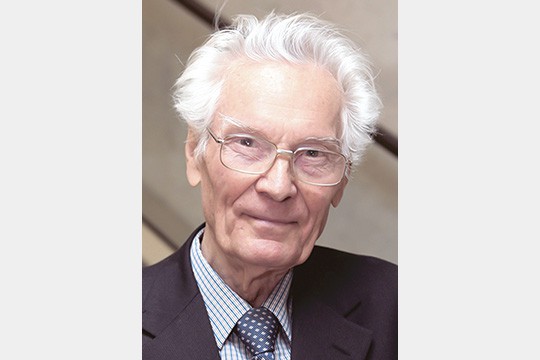They do not understand and do not know that if such is our will, we will not be conquered ... neither by the millions of their gold, nor by the millions of their armies; that if such is our will, we cannot be compelled to do that which we do not wish to do, and that there is no power on earth that could compel us.
F.M. Dostoevsky
I finished writing this work, logically expressed in three parts in terms of content and problems, but in its essence and spirit organically representing a single whole, on June 22, 2023 – the date of the anniversary of the attack of fascist Germany on my homeland, the Soviet Union. That day remained in my memory for the rest of my life. I was in bed in a hospital ward with other children, and suddenly we saw all the medical staff running out of the hospital building into the courtyard, to the loudspeaker. We children rushed out after the adults. Vyacheslav Molotov was speaking on the radio. He reported the treacherous attack of fascist Germany on our country. The last words of his speech, “Our cause is just, the enemy will be defeated, victory will be ours!” evoked neither applause nor cheers, but rather there was a heavy, oppressive silence, and then the crying and sobbing of women, piercing with pain and horror. The men stood silent, frowning. Only after about 15 or 20 minutes did people begin to disperse. The next day, squads of mobilized men – young, healthy, cheerful, handsome men – began to pass by the hospital to the station. They did not know, and could not yet know, what a long, difficult, tragic, and heroic journey they would have to make to finish off the fascist beast in its lair and hoist the sacred Banner of Victory over the Reichstag.
This day has become a day of remembrance and sorrow for each of us and for our entire nation. Could anyone have foreseen or predicted that so many years after the end of the Great Patriotic War we would again be defending our homeland from fascist invaders and that our heroic soldiers would destroy enemy tanks bearing German crosses in the same places where our grandfathers, fathers, and brothers once fought?! Perhaps this article on fascism will be my most modest but sincere contribution to our inevitable coming Victory, which is determined by the logic of History itself. There is no other way!
* * *
THE title of this article was chosen in connection with a very important event in the spiritual life of humankind and my personal life: the 1,700th anniversary of the Revelation of John the Theologian – the Apocalypse.
The Greek Orthodox Church and the Greek government organized a large international conference dedicated to this date. Representatives of all Orthodox Christian churches, other Christian denominations, as well as well-known scientists and cultural figures were invited. Since I was studying world philosophy, including ancient Greek philosophy, as well as history, religion, and culture, I received an invitation to participate in the conference. I was invited to come with my whole family, but circumstances were such that I was only able to take with me my youngest son Alexander, then still a schoolboy. We were struck not only by the island of Patmos itself, but above all by the granite cave where St. John the Theologian lived and worked. The reports of the participants of this forum were exceptionally interesting, profound, and relevant. 1,700 years have passed, but in the reports of the participants, the revelations of St. John the Theologian sounded as if he had written them quite recently. All the speakers spoke about the tragic situation that had developed by that time that threatened to destroy humanity and all life on Earth. I have been to many international congresses and conferences in my life, but I have never been so deeply and profoundly moved, both in my soul and mind. The participants of the forum openly named the culprits of the current situation – the US, Great Britain, the NATO bloc, and the Western world as a whole. And despite the magnificent reception and excellent organization of the forum, all of its participants felt an inexplicable anxiety and sadness that seemed to hang in the very atmosphere of the island.
In connection with current events, I recalled the lines of the great Russian poet, writer, thinker, and diplomat Fyodor Tyutchev, written shortly before the outbreak of the Crimean War, that sound as if they were written today. A deep, perceptive man and an experienced diplomat, he realized that Europe would use any opportunity to try to destroy the powerful state standing in their way that Russia was at that time. Tyutchev foresaw that the anger and hatred of the West toward Russia, which had been accumulating for three decades, would soon inevitably lead to military action against it, that the West would try, if not to destroy Russia, then to cause it irreparable damage: “It has long been possible to predict that this rabid hatred, which ... for 30 years, and more and more every year, has been kindled in the West against Russia, will break loose someday. This moment has come.”1
We can say that the entire content of my article is a kind of echo of the Apocalypse of John the Theologian.
The history and literature of the Western world is replete with stories of the amazing adventures of Europeans in distant lands, making new geographical discoveries that fascinate any reader with pictures of unknown worlds unseen before. Unsophisticated readers have always marveled at the remarkable human qualities of the pioneers, their intelligence, ingenuity, nobility, and lofty ideals. While still in school, I relished novels by Jules Verne and other European writers and admired the exploits of the heroes of these stories. So did all my peers. The difficulties that the discoverers encountered on their journey made their lives heroic, and their determination, energy, and will evoked respect and admiration.
Was the overall picture so ideal in reality? Alas, this is not always the case; history testifies rather to the contrary.
European authors often tried to embellish their “deeds,” to present them as something noble, creative, andd aimed at improving the lives of all humankind. In reality, the history of the Western world is, unfortunately, inextricably tied with its crimes against humans and humanity, no matter how pretty the images it may be hiding behind.
The widely proclaimed freedom, democracy, competition, creative initiative, the formation of higher spiritual values – all this was essentially aimed at the all-around enrichment of Europeans and the enslavement and robbery of the colonized peoples.
To this day, European culture and science are deservedly and rightly admired. Anyone who visits any European country admires its architecture, painting, literature, music, theater, etc. Masterpieces created, for example, during the Renaissance are truly impressive. My professional, scientific, and practical interests were largely connected with the Western world, its history, philosophy, science, and culture. I had the opportunity to visit almost every European country; to meet and talk with outstanding scientists, politicians, cultural figures; to teach at famous European universities; to work in local libraries and archives. My works – monographs and articles – on Western philosophy, culture, religion, and politics aroused significant interest abroad, and have been translated and published. For many years, I have been a member of the European Society of Culture and have always sincerely admired and continue to admire the geniuses and talents of the peoples of Europe and their contribution to world culture and civilization.
However, at the same time, as a scientist and any critical thinker, the question has never left me: At what and by whose expense was this achieved? By what means and methods?
Usually, during discussions of cultural issues, such questions have not been asked; they have simply been avoided. But these questions are at the heart of the great European achievements. Thanks to geographical discoveries and conquests of new lands, Europeans developed their economy, science, and culture. The huge funds necessary for this were siphoned off from the colonies.
And where, for example, did the fine collections of European museums devoted to ancient cultures come from! It seems that Europeans tried to take everything they could carry away from conquered lands and states.
A similar fate befell Russia. This has happened throughout our history and during all invasions of foreign invaders.
The progress of Western culture was organically connected with the development of capitalism and imperialism. The widely proclaimed freedom, democracy, competition, creative initiative, and the formation of higher spiritual values – all this was essentially aimed at the all-round enrichment of Europeans and the enslavement and robbery of the colonized peoples.
This process, as we know, began to develop actively with the beginning of the Age of Exploration. European countries constantly competed in conquering new lands to increase their economic and political might.
The rapid development and successes in the field of science and technology were directly related to this. And for what? It was generally believed that all this was aimed at improving both nature itself and human life. Science and technology have always been and are precisely the means by which it was possible to improve nature and man. However, as history shows, in reality, new technologies were used not so much for this purpose as for enriching the conquerors and enslaving indigenous populations.
Thus, many researchers rightly believe that the true essence of technology is not only the domination of man over nature, but also the domination of man over other men. This is the essence of Western politics itself, the power and greatness of West European imperialism. It is therefore not surprising that “periods of technological creativity correspond to eras of Western expansion. The competitive nature of Western society has been the engine of both technological innovations and imperialism.”2
Like it or not, the nature of human society is such that there is not and cannot be universal equality, at least not for the foreseeable future. On the contrary, we are seeing some countries using technology to gain advantages over other countries. As has been rightly observed [by Leon Kass], “What we really mean by ‘Man’s Power over Nature’ is a power exercised by some men over other men, with a knowledge of nature as their instrument.” It would be quite legitimate to say that “it is the disparities in knowledge of nature – and in the institutions such as universities, governments, and corporations that transform that knowledge into practical applications – that have fueled the disparities of power associated with technological change.”3 The possession of the latest, more advanced technologies and their use or the threat of their use to impose one’s will on weaker peoples and societies is the very essence of imperialism, since it always seeks to subjugate other peoples and countries. “The temptation to coerce is especially compelling when weaker societies fail to live up to the expectations of the powerful, for instance by practicing a different religion, treating their people in ways that offend, threatening their neighbors, or withholding valuable resources.”4
Imperialism and technological progress are inextricably linked. At the heart of this alliance is the arrogance of Western society, the dogma of its having been chosen, a belief that “technological superiority demonstrates religious, cultural, and even biological superiority over non-white peoples.”5
The discovery of America, this meeting and clash of civilizations, was an epochal event in the history of mankind. For some, it became an increase in power and prosperity, for others – a real disaster. Here, for the first time, “white men” began to ruthlessly destroy the indigenous population that had lived on these lands for centuries. This was exacerbated by the deadly infectious diseases brought by Europeans – plague, smallpox, typhus, cholera, and others – against which the local population had no defense. As a result of epidemics, it died out almost entirely. The death rate among the Native Americans was catastrophic in scale.
For example, according to estimates, between 1519 and 1600, the population of Mexico fell by 93% (from 14 million to 1 million). The Western Hemisphere as a whole may have lost about 94% of its native population; its numbers in the territories that later became the 48 contiguous states of the US (excluding Alaska) fell from 5 million in 1492 to 250,000 at the end of the 19th century, a decline of 93%.6 It is well known that Americans contributed in every possible way to the extinction of the native population by distributing blankets and other items contaminated with smallpox. Many saw God’s help, the hand of God, in the speed with which the epidemics were wiping out the Indians. For example, local Governor of Massachusetts Bay John Winthrop declared: “For the natives, they are neere all dead of small Poxe, so that the Lord hathe cleared our title to what we possess.”7 The Indian Removal Act of 1830 officially endorsed the ethnic cleansing that had taken place before the law was passed.
It took the Europeans about four centuries to conquer the two Americas after their discovery by Columbus, which can rightfully be called a time of total genocide of the indigenous population. The West, especially the former metropoles, tries not to remember this too much, but the oppressed peoples preserve the memory of it and will never forget.
Europeans attributed their successes in colonial conquests to the surge, breakthroughs, and accelerating development of science, technology, and medicine. In the historical literature, one can find a detailed characterization of different periods of European scientific and technological progress, specific details of the development of new types of weapons, and, in general, new technologies from the 15th century to the present day in the areas of navigation and shipbuilding, small arms, artillery, pharmaceuticals and medicine, means of communication, development of aviation, development of nuclear technology, etc. They were convinced that their superiority, and above all racial superiority (this is a constant) determined and will continue to determine their strength and power.
However, as history shows, this turned out to be greatly exaggerated. Siyyid Ali Muhammad, the famous thinker and religious figure of the East, gave a profoundly objective assessment of the mindset and ideology of the West:
The people of the West, among whom the first evidences of this great Industrial Revolution have appeared, are, alas, as yet wholly unaware of the Source whence this mighty stream, this great motive power, proceeds – a force that has revolutionized every aspect of their material life.… In their concern for the details of the working and adjustments of this newly conceived machinery, they have gradually lost sight of the Source and object of this tremendous power which the Almighty has committed to their charge. They seem to have sorely misused this power and misunderstood its function. Designed to confer upon the peoples of the West the blessings of peace and of happiness, it has been utilized by them to promote the interests of destruction and war.8
These words, as we see, are not only still relevant, but sound an alarming warning of the coming danger to humanity that “enlightened” Western society brings with it.
Even if we turn to such positive topics as health care and medicine, we will find that the fight against infectious diseases, epidemics – with all its noble goals – was carried out as part of the main task of expanding colonial conquests and building empires. The achievements of medicine were designed to improve the quality of life for Europeans in the countries of Europe itself, as well as in the colonies. The successes of medicine in
reducing mortality, especially in the second half of the 19th century, were indeed impressive: By the beginning of the 20th century, it was possible to reduce the mortality rate of Europeans in the colonies to 72% to 98% (West and South Africa, East Indies, Jamaica, and Ceylon).9
The indigenous population of the conquered territories received assistance only occasionally; preventive measures were applied when it was not burdensome, as a kind of “side effect.” In serious situations, during epidemics, the policy was to just evacuate Europeans from dangerous areas. All this led to the fact that the health of the indigenous population not only did not improve but rather deteriorated. The advances of medicine did not benefit all residents, but only the conquerors. And to this day we see that medicine is widely used for economic and political purposes to strengthen Anglo-Saxon and European power and to weaken competitors. It is obvious that the entire colonial policy of Western countries was and is a direct and immediate genocide, with all ensuing consequences. And no good motives can hide the essence of this cruel, inhuman policy of genocide and violence, which is the second if not the first nature of the
“enlightened” and “progressive” Western civilization.
Here is one of the countless Pharisaic statements of the Anglo-Saxons about the need for a greater British presence in the Middle East that would “be the means of extending our knowledge and religion over people now immersed in the profoundest ignorance. It seems to be a law of nature that the civilized nations shall conquer and possess the countries in a state of barbarism and by such means, however unjustifiable it may seem at first sight, extend the blessings of knowledge, industry, and commerce.”10
Well-armed with the latest weapons, British troops brutally and ruthlessly dispatched the warriors of the local population who were much more numerous but lacked modern weapons. Here is what Churchill, then a war correspondent, wrote about the battle of Omdurman (1898): “Thus ended the battle of Omdurman – the most signal triumph ever gained by the arms of science over barbarians. Within the space of five hours the strongest and best-armed savage army yet arrayed against a modern European Power had been destroyed and dispersed, with hardly any difficulty, comparatively small risk, and insignificant loss to the victors.”11 It is known that in 1920, Churchill insisted on the use of chemical weapons (mustard gas bombs) in Iraq in order to “inflict punishment on recalcitrant natives.”12 In the 1920s, the Italians also used phosgene and mustard gas bombs in their military action against Libya, killing threequarters of the nomads. Military historians describe this operation as “one of the cruelest military campaigns in modern colonial history.”13
The Italians were even more brutal in Ethiopia in 1935-1936, making extensive use of aviation. According to a plan to crush resistance, it was supposed to be preceded by “the violent action of all our bombers on all the principal Ethiopian centers, from the border to Addis Ababa. Everything must be destroyed by explosive and incendiary bombs. Terror must be spread in the whole empire.”14 Mussolini’s son Bruno, who participated in the operation as a pilot, shamelessly recalled:
We set fire to the wooded hills, to the fields and little villages. It was all most diverting ... the bombs hardly touched the earth before they burst out into white smoke and an enormous flame and the dry grasses began to burn. I thought of the animals: God, how they ran. After the bomb racks were emptied I began throwing bombs by hand.... It was most amusing.... Surrounded by a circle of fire about five thousand Abyssinians came to a sticky end. It was like hell.15
Benito Mussolini himself repeatedly ordered the use of chemical weapons (mustard gas) against the Ethiopian Army and civilian population, even though this was contrary to an international convention signed by Italy. Speaking from the rostrum of the League of Nations, Emperor Haile Selassie emphasized that the spraying of poisonous gases from airplanes over vast areas was primarily aimed at the civilian population to terrorize and destroy them, resulting in the pollution of water bodies, pastures, and fields. “This horrifying tactic was successful. Humans and animals were destroyed. All those touched by the rain of death fell, screaming in pain. All those who drank the poisoned water and ate the contaminated food succumbed to unbearable torture.”16
After World War II, the technological progress of developed countries reached an unprecedented level, especially in the field of new types of weapons of mass destruction capable of wiping entire cities off the face of the earth. It would seem that imperialist states could easily conquer new lands and countries. But in fact, it turned out that military power and new technologies did not always guarantee success in colonial conquests.
Why did a developed country such as France fail in Algeria? Even more surprising is the defeat of the US in Vietnam. No one could ever imagine that such a powerful state would lose to a country that Kissinger contemptuously called a “third-class communist peasant state” and Lyndon Johnson called a “damn little pissant country.”17 And if we were to add to this the shameful defeat of the US in Afghanistan, it would be not just a miracle but a certain historical pattern – a pattern for nations defending their freedom and independence from aggressors of all stripes.
During Operation Rolling Thunder, which lasted three years and nine months, 643,000 tons of bombs were dropped on North Vietnam. The total number of bombs dropped on North and South Vietnam was triple the amount used by the Americans during all of World War II.18 Also, along with conventional bombs, phosphorus and cluster munitions and napalm bombs, prohibited by international conventions, and later more accurate laser-guided bombs were used. And still it proved impossible to conquer North Vietnam. Even the strongest weapons proved powerless against the will of the people who sought to liberate their land from the invaders. A key mistake of the Americans was to overestimate the importance of technology and weapons in modern warfare, underestimating the role of the individual, a people defending its life, freedom, and independence.
Such mistakes are inherent in all imperialist countries waging wars of aggression. Mao Zedong wrote about this very well in his time (back in 1938):
The theory that “weapons decide everything” … constitutes a mechanical approach to the question of war and a subjective and one-sided view. Our view is opposed to this; we see not only weapons but also people. Weapons are an important factor in war, but not the decisive factor; it is people, not things, that are decisive. The contest of strength is not only a contest of military and economic power, but also a contest of human power and morale.19
One can only add to this the conclusion drawn by American historians from the Iraq war: The history of aviation in the post-World War II period shows that continuous improvement in technology will ensure only that “political and military defeats will come later, and at greater cost.”20 It seems to us that this is not only true, but also inevitable.
Today, the US is one of the most powerful states, but its domestic and foreign policy is openly militaristic. It is no coincidence that the highest positions in the country’s top leadership are occupied by former heads of military departments and companies associated with the production of weapons. As The New York Times wrote back in 2004:
[F]ormer Lockheed executives, lobbyists and lawyers hold crucial posts at the White House and Pentagon, picking weapons and setting policies. . . .
Men who have worked, lobbied and lawyered for Lockheed hold the posts of secretary of the Navy, secretary of transportation, director of the national nuclear weapons complex and director of the national spy satellite agency.
. . . Former Lockheed executives serve on the Defense Policy Board and the Homeland Security Advisory Council, which help make military and intelligence policy and pick weapons for future battles.21
I recall a conference at the Diplomatic Academy of the Ministry of Foreign Affairs of the Russian Federation, held jointly with the United States Institute for Strategic Studies, whose participants included representatives of the General Staff and other Russian military agencies and military professionals and experts from various military organizations and institutions of the US. It discussed in detail issues of civilian oversight of the armed forces. The reports and discussions revealed that in the Soviet Union, civilian oversight was quite evident, whereas in the US, such control over the country’s armed forces was very weak. Today, US domestic and foreign policy is even more strictly directed in the interests of the military-industrial complex.
NOTES
1 Kozhinov V.V. Tyutchev. Moscow: Molodaya gvardiya, 2009, p. 320.
2 Headrick, D. Power Over Peoples: Technology, Environments, and Western Imperialism, 1400 to the Present. Princton University Press, 2010, p. 5.
3 Ibid., p. 4.
4 Ibid., p. 5.
5 Ibid.
6 Ibid., p. 127.
7 Ibid., p. 124.
8 Ibid., pp. 178-179.
9 Ibid., p. 250.
10 Ibid., p. 196.
11 Ibid., p. 216.
12 Ibid., p. 315.
13 Ibid., p. 325.
14 Ibid.
15 Ibid., p. 326.
16 Ibid., p. 327.
17 Ibid., p. 340.
18 Ibid., p. 345.
19 Ibid., p. 363-364.
20 Ibid., p. 363.
21 Ibid., p. 372.
read more in our Telegram-channel https://t.me/The_International_Affairs

 12:18 28.12.2023 •
12:18 28.12.2023 •



























